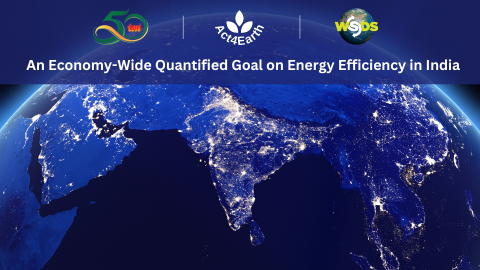National Energy Efficiency Target pivotal to steer India towards swifter Energy Transitions and its Net Zero Goals: TERI Report

New Delhi, September 4, 2023: The recently launched policy brief by The Energy and Resources Institute (TERI) titled 'India: Transforming to a Net Zero Emission Energy System,' underpins the critical role of setting a national goal on energy efficiency to accelerate India's progress towards a net-zero emissions future. Energy efficiency, widely considered as the first fuel, contributes not only to cost savings but also to energy security.
Highlighting that if India continues with a business-as-usual approach, its primary energy demand will double between 2020 and 2050, the policy brief suggests that through significant energy efficiency improvements in electrification and low-carbon energy infrastructure deployment, this growth in demand could be reduced by 20%. The G20 Energy Transitions Ministers’ Meeting Outcome Document also underscores the need to double energy efficiency, decarbonize energy-intensive industries, and promote sustainable lifestyles.
India has national goals on non-fossil fuel energy but is yet to formulate one on energy efficiency. Underlining this and how several countries worldwide have recognized the significance of energy efficiency in achieving net-zero emissions and are setting explicit energy efficiency targets as part of their climate mitigation policies, Mr RR Rashmi, Distinguished Fellow, TERI underscored "It [energy efficiency] is not just an aspirational national goal; it is a goal to which they stand committed to demonstrate achievement for international scrutiny.”
The European Union and Germany have set absolute energy efficiency targets, while Australia, United States, Thailand, and China have committed to energy productivity or energy intensity improvements to reduce their energy consumption.
“India has a dedicated mission in the National Action Plan on Climate Change for enhancing energy efficiency. As energy production and consumption constitutes almost 80% of total emissions, it is time for us to consider a policy initiative on quantified goal for energy efficiency for different sectors in India. This will support the achievement of economy wide emissions intensity goal in a predictable manner," highlighted Mr Rashmi.
The policy brief suggests three models for India to set up economy-wide energy efficiency targets. Considering India's Net Zero target of 2070, and keeping 2022 as the reference year, Model 1 suggests defining the economy-wide energy efficiency targets in short, medium, and long-term periods using modelling exercises.
Model 2 as discussed in the policy brief recommends adopting a bottom-up approach involving stakeholders and sector-specific targets to develop and achieve economy wide energy efficiency. Since rigorous sectoral targets will compel actions and encourage governments and economic sectors to achieve certain predetermined outcomes, such a sectoral aggregation approach will provide sectors with greater ownership of targets, thereby improving chances of achieving them. An aggregation of these sectoral targets could then lead to an economy-wide energy-efficiency target, advocates the policy brief.
Model 3 in the policy brief which refers to the federal unit approach suggests a policy progress indicator for energy efficiency where states could determine their individual targets, and their aggregation could be used for an economy-wide energy efficiency target. According to the policy brief, by allocating individual targets based on the state’s contribution to energy generation and emissions intensity, the state agencies would be more likely to take ownership in in devising energy efficiency compliance mechanisms.
Ultimately TERI’s policy brief on energy efficiency highlights that establishing an economy-wide energy efficiency target will not only complement India's nationally determined contributions but also facilitate a coordinated approach for rapid energy transitions.
To access the policy brief, click here: https://www.teriin.org/policy-brief/economy-wide-quantified-goal-energy-efficiency-india
